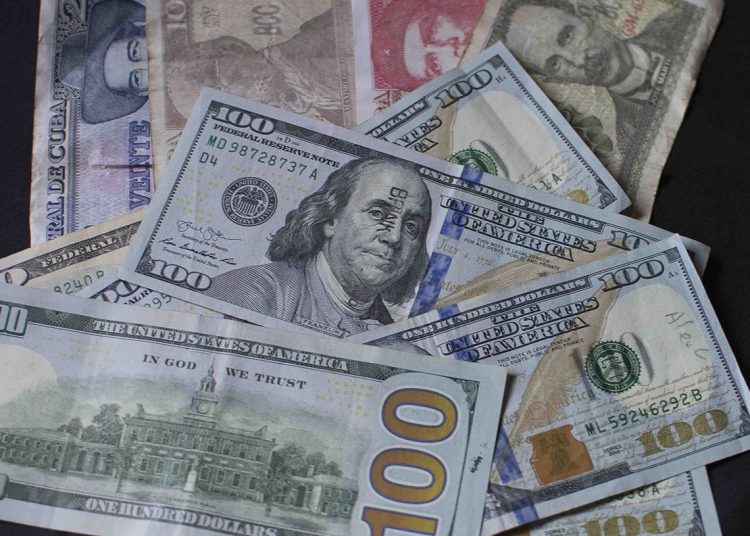As part of the package of measures planned for this year, the Cuban government plans to “resize” the exchange market starting in February.
This was announced during the first meeting of the Council of Ministers in 2024 in which the island’s authorities took stock of the announced changes, advanced their next steps, and defended the implementation of the measures, which they classified as “necessary and unpostponable.”
As Minister of Economy Alejandro Gil Fernández reported at the meeting, in February the government “will advance in the presentation of proposals to resize the exchange market, the intervention of the informal sector, and the control of the exchange rate in the country.”
This includes “the determination of the exchange rate and the formation of prices,” the Cuban Presidency website reported.
The minister assured that “we are working hard on this, due to the impact it has on the promotion and stimulation of production,” although he did not advance – at least not publicly in the report – how the exchange market will be “resized” and the informal rate will be intervened.
There was also no advance on the possible official exchange rate that could begin to govern from this resizing.
Currently, the official exchange rate for individuals remains at 120 Cuban pesos (CUP) per USD, while the value of the USD has continued to rise in the informal market, where it is quoted at around 285 CUP.
More changes and government goals
As part of the package planned to “correct distortions and re-boost the economy,” the Cuban authorities also have among their next projections “recovering remittance flows, encouraging their attraction and studying the feasibility of new channels, platforms and the use of digital scenarios for remittances and banked collection and payment operations from abroad,” according to the official press.
In addition, implementing a “new mechanism for the allocation and management of liquidity for all economic actors,” in order, as stated in the Council of Ministers, “to achieve a more harmonious functioning of the economy, and thus make progress in the autonomy of the state enterprise.”
Also for February, the government plans to “update the regulations that allow local development projects to be reorganized; as well as decentralize for territorial governments the power to approve wholesale and retail prices of Natural and Traditional Medicine, of local dispensary and industrial production.”
At the meeting of the government body, it was recalled that salary measures have already been implemented in the Health and Education sectors, and tariff exemptions on the import of non-commercial food and hygiene products have been extended until March 31.
Likewise, the tariff increases on the import of tobacco, cigars, and rum were recently made official, as well as the 50% reduction of tariffs on the import of raw materials and intermediate goods for use in national production.
“Political processes” on the measures
At the same time, the island’s government announced the development of “political processes” on the measures, which will be developed “during the coming months” to “accompany the implementation” of the measures.
They will cover the Communist Party members, the administrative structures, labor and student groups and also the population in the communities, as was advanced in the meeting of the Council of Ministers.
President Miguel Díaz-Canel assured that the objective of these processes is “to advance coherently in the implementation of economic measures and that we can address the social, ideological and economic problems, with comprehensive analysis.”
https://twitter.com/PresidenciaCuba/status/1751939204378976426?ref_src=twsrc%5Etfw%7Ctwcamp%5Etweetembed%7Ctwterm%5E1751939204378976426%7Ctwgr%5E87fa39b262c86fb5b48753fc8b6ef907480b476e%7Ctwcon%5Es1_&ref_url=https%3A%2F%2Foncubanews.com%2Fcuba%2Fgobierno-cubano-planea-redimensionar-el-mercado-cambiario-en-febrero%2F
The president asserted that these consultations seek to “evaluate and propose, with rigor and creativity” the measures implemented by the Executive.
“We can encounter work groups, Party nuclei that do not understand, and we must explain them well,” said Díaz-Canel, who called for “keeping our ears open” to the population’s criteria.
As he has done on other occasions, the Cuban president defended the planned changes and denied that they were part of a neoliberal package. In that sense, he once again attacked “the attempts of the enemies of the Revolution” to present the announced measures as such.
However, the president recognized that these changes “will have a good development to the same extent that we are capable of implementing and conducting them well,” for which, he said, “a constant feedback process” is necessary.











What makes people do what they do? From what arises human spirit? Money [personal gain]? Material conditions? Emotional attachments? Archetypal influences? All of these things? It is good to know this if you want t manage a country.